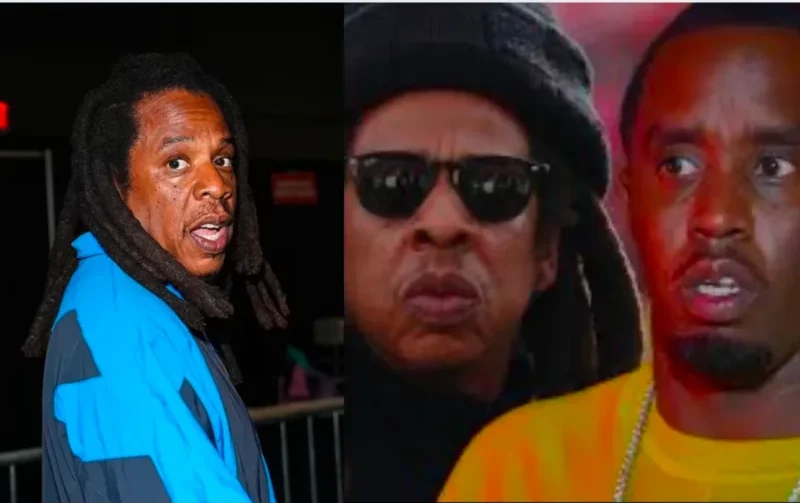Background of the Allegations
The allegations made against Jay-Z and Sean ‘Diddy’ Combs have emerged as a pivotal aspect of a high-profile legal case. According to reports, a woman has accused both musicians of committing rape when she was just 13 years old in the year 2000. This allegation sheds light on the serious issues surrounding sexual assault and the alleged involvement of notable public figures, consequently igniting discussions in both the media and the legal community. The gravity of these accusations cannot be overstated, particularly given the age of the individual at the time of the purported offense.
In the context of the lawsuit, the timeline reveals that the incident allegedly occurred during a pivotal moment in the careers of both Jay-Z and Diddy. At the turn of the millennium, both artists were rapidly ascending to iconic status within the hip-hop genre. The emergence of these allegations raises questions regarding the dynamics of power and accountability that accompany fame. As the case unfolds, it is essential to highlight the societal implications of such serious accusations, particularly prominent figures’ accountability in instances of alleged sexual misconduct.
In response to the allegations, both Jay-Z and Diddy have publicly denied any wrongdoing. Their legal teams are actively engaged in addressing these claims within the judicial system. The contrast between the accusations and the accused’s steadfast denials illustrates a complex intersection of personal and public narratives that will be closely scrutinized as further information comes to light. It is crucial to examine these matters with sensitivity, given the impact of such allegations on all parties involved and the broader implications for the ongoing discourse around sexual violence and accountability in the entertainment industry.
The Legal Significance of Requiring a Real Name
In legal proceedings, the use of a plaintiff’s real name can carry substantial implications, especially in cases involving high-profile individuals. In the ongoing lawsuit featuring Jay-Z and Diddy, the motion for the plaintiff, previously referred to as ‘Jane Doe,’ to disclose her true identity raises complex considerations. One of the primary legal impacts of requiring a real name is the effect it can have on the perceived credibility of the case. The anonymity afforded by using a pseudonym can sometimes suggest that the allegations are less substantiated. Conversely, revealing one’s identity may enhance the seriousness of the claims, as it often represents a willingness to stand behind the accusations publicly.
Moreover, the media attention surrounding a case of this magnitude can magnify the stakes involved when a name is disclosed. The transition from a symbolic reference like ‘Jane Doe’ to a real name can shift the narrative landscape, drawing even more scrutiny from the public and the press. This heightened focus not only influences public opinion but can also potentially affect the trial’s proceedings, as jurors may be swayed by external perceptions. Media portrayal of the case might inadvertently impact the parties involved, often leading to a battleground where public sentiment plays a role in the legal outcomes.
Furthermore, the psychological effects on the accuser cannot be overlooked. For many, the pressure of revealing their identity can be overwhelming and deter genuine cases from being pursued. The public nature of courtroom trials can instill fear, potentially discouraging other victims from coming forward. In high-profile cases, the dilemma of maintaining anonymity while pursuing justice becomes a critical point of contention that can alter the overall dynamics of legal battles. The actions surrounding the requirement for real names in lawsuits, particularly in celebrity cases, thus emphasize the intricate balance between legal principles and personal ramifications.
The Social Media Fallout and Tina Knowles’ Hacking Incident
The recent hacking incident involving Tina Knowles, the mother of renowned singer Beyoncé, has added another layer of complexity to the ongoing lawsuit surrounding Jay-Z and Diddy, who are facing serious allegations. Knowles’ Instagram account was compromised, leading to a ‘like’ being registered on a post that discussed the contentious legal battle. This seemingly innocuous action stirred a wave of speculation and concern, with many questioning whether Knowles had taken a position on the allegations or if the act was purely incidental, a result of the hacking.
In today’s digital age, social media platforms serve as powerful communication tools, particularly for public figures. The implications of such an incident extend beyond mere technology: they reflect the vulnerability of personal accounts and the potential for misinterpretation by the public. When a prominent personality’s social media account is hacked, it often raises inquiries about their affiliations or opinions regarding current events, particularly when tied to high-profile lawsuits involving celebrities. The incident not only cast a spotlight on Knowles but also highlighted how such digital missteps can inadvertently draw individuals into complex controversies.
The narrative surrounding the allegations against Jay-Z and Diddy was already tumultuous, characterized by differing public perceptions and media portrayals. The involvement of Tina Knowles, albeit through a hacked account, underscores the unpredictable nature of social media’s role in shaping public opinion. It demonstrates how quickly rumors can proliferate online, often without substantiation. Consequently, such incidents prompt critical questions regarding the intersection of social media exchanges and high-stakes legal proceedings, emphasizing the need for public figures to navigate these platforms with heightened awareness of their influence and potential repercussions.
Public Reaction and Media Coverage
The unfolding events surrounding the lawsuit involving Jay-Z and Diddy have sparked significant public interest and generated a variety of reactions across social media platforms and mainstream media channels. As news of the allegations broke, reactions ranged from disbelief to outrage, highlighting the polarizing nature of these accusations within the entertainment industry. Fans and followers of these prominent figures have expressed their opinions vocally, with some standing in support of the artists while others have condemned their alleged actions. This divide underscores the complexities of celebrity culture and how it often informs public perception in matters of sexual assault.
In addition to social media commentary, numerous celebrities have weighed in on the situation, contributing to an evolving discourse on accountability in the entertainment realm. Some have expressed solidarity with victims of sexual assault, emphasizing the importance of believing survivors and fostering an environment of safety and respect. Others have called into question the timing of the allegations and their potential implications for the careers of Jay-Z and Diddy. This diverse spectrum of responses has ignited discussions about the broader implications of the #MeToo movement and its ongoing demands for transparency in cases of sexual misconduct.
The media coverage surrounding the lawsuit has also significantly shaped public understanding of the dynamics at play. Coverage has ranged from serious journalism that delves into the specifics of the allegations to sensationalized reporting that may serve to distract from the gravity of the situation. This disparity in reporting reflects a larger challenge within the media landscape regarding how such allegations are presented and discussed. As society continues to grapple with issues of power dynamics and consent, this case serves as a significant point of reference for discussions about accountability and how allegations of sexual misconduct are treated within the entertainment industry. In conclusion, the public reaction and media narrative surrounding this lawsuit will likely influence future discussions about sexual assault allegations, as well as accountability within high-profile segments of society.




